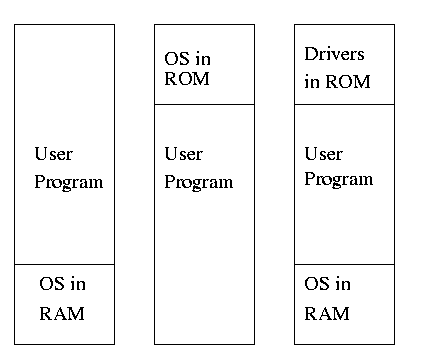Operating Systems
================ Start Lecture #16 ================
Present answers to midterm.
Note: I will place ** before each memory management
scheme.
4.1: Basic Memory Management (Without Swapping or Paging)
Entire process remains in memory from start to finish and does not move.
The sum of the memory requirements of all jobs in the system cannot
exceed the size of physical memory.
** 4.1.1: Monoprogramming without swapping or paging (Single User)
The ``good old days'' when everything was easy.

- No address translation done by the OS (i.e., address translation is
not performed dynamically during execution).
- Either reload the OS for each job (or don't have an OS, which is almost
the same), or protect the OS from the job.
- One way to protect (part of) the OS is to have it in ROM.
- Of course, must have the OS (read-write) data in ram.
- Can have a separate OS address space only accessible in
supervisor mode.
- Might just put some drivers in ROM (BIOS).
- The user employs overlays if the memory needed
by a job exceeds the size of physical memory.
- Programmer breaks program into pieces.
- A ``root'' piece is always memory resident.
- The root contains calls to load and unload various pieces.
- Programmer's responsibility to ensure that a piece is already
loaded when it is called.
- No longer used, but we couldn't have gotten to the moon in the
60s without it (I think).
- Overlays have been replaced by dynamic address translation and
other features (e.g., demand paging) that have the system support
logical address sizes greater than physical address sizes.
- Fred Brooks (leader of IBM's OS/360 project and author of ``The
mythical man month'') remarked that the OS/360 linkage editor was
terrific, especially in its support for overlays, but by the time
it came out, overlays were no longer used.

